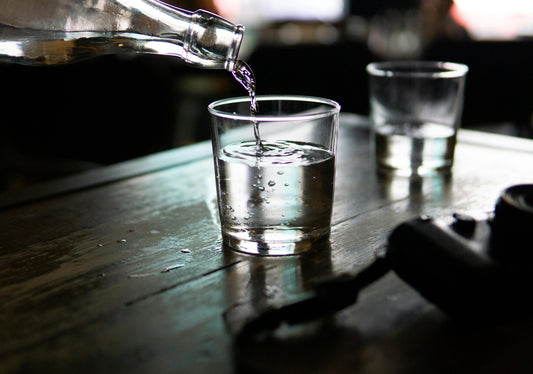Is drinking hard water bad for you? In short: no. Drinking hard water is actually probably really good for you, and it’s associated with a lower risk of cardiovascular disease. At worst, you won’t experience any health problems from drinking hard water.
In fact, it’s the other way around. Drinking softened water is the bigger health problem, if the water has been softened by an ion exchange salt-based softener.
And in this article, we’ll explain why.
Is Hard Water Safe to Drink?
Hard water is water that contains large amounts of magnesium and calcium. According to the United States Geological Survey, over 85% of American households have some sort of hard water problem.
Why? Hard water is nearly ubiquitous in natural water; it’s typically found in streams and natural springs. Magnesium and calcium are integral parts of healthy soil, so hard water is especially present in well water.
It makes it hard to wash your hands; it makes it hard to clean your clothes. Hard water can be a particularly annoying nuisance, and you might have even heard that it’s bad for you to drink hard water. It makes sense, after all: If these substances cause so much damage to plumbing and appliances, just imagine what they’re doing to the inside of your body.
But is that right? Is hard water actually bad for you?
Hard Water Health Effects
Since hard water is just water that contains magnesium and calcium, the health effects of hard water are largely the same as the health effects of magnesium and calcium supplementation.
-
According to a review published in the Journal of the American Osteopathic Association, low magnesium levels make Vitamin D ineffective. And, since so many Americans have low magnesium levels, as many as 50 percent of Americans have Vitamin D stored and inactive.
Also, here are a host of benefits associated with magnesium and calcium, courtesy of Healthline:
-
They may support better bone growth. Calcium in particular, since it’s one of the principal minerals that makes up bone. And magnesium is just as important for the same purpose. Remember how we mentioned that magnesium affects Vitamin D absorption? Well Vitamin D helps calcium absorption.
-
According to a review published by the National Kidney Foundation, magnesium deficiency is linked to chronic inflammation. That means proper amounts of dietary magnesium is associated with a decreased risk for hypertension, ischemic heart disease, stroke, metabolic syndrome, and more.
-
Other benefits may include better sleep quality and an overall boost in mood.
The National Research Council has stated that hard water may contribute to magnesium and calcium in people’s diets, and researchers have found a link between hard water consumption and a lower incidence of cardiovascular disease (although more research needs to be done).
So, drinking hard water is certainly not bad for you. At worst, it’s neutral. At best, it’s extremely healthy, although we will say that depends on a number of factors.
The Dangers of Soft Water: Drinking a Large French Fry?
Now that we know that drinking hard water isn’t bad for us, let’s flip the question: Is drinking softened water bad for you?
Yes and no.
In the case of ion exchange, salt-based water softeners, soft water is, unfortunately, pretty bad for you -- especially if you have heart disease or blood pressure issues.
During the process of ion exchange, magnesium and calcium is replaced with sodium. According to the Water Quality Association, this conversion happens at a rate of 10 grains per gallon to 80mg/liter. (A bit confusing because of the measurement change, but stick with us).
That means that, for every gallon with 10 grains of magnesium and calcium, an ion exchange water softener will replace it with 80mg/liter of sodium.
The dangers of increased sodium intake have been very clear for decades. The American Heart Association recommends you should eat no more than 2,300mg of sodium per day, and 1,500mg is probably ideal. However, according to the CDC, the average American consumes roughly 3,400mg of sodium per day -- much more than they need.
And, if you own an ion exchange, salt-based water softener, much of that increased sodium intake is going on underneath your radar.
The average person drinks about 3.7 liters of water per day. That’s an extra 300mg of sodium if you own a salt-based softener. 300mg of sodium is roughly the equivalent of a large order of french fries.
So, is drinking soft water good for you? Probably not. Would you drink a large order of french fries every day?
How Can You Get Healthy Soft Water?
Now the question becomes: How can I get rid of my hard water problems without damaging my health? I don’t want to increase my sodium intake more than it already is, especially just to drink flavorless water (when you could be eating some french fries!)
The answer lies in an alternative to salt-based ion exchange water softening called template assisted crystallization, a system of no-salt softening that FilterSmart uses to reduce the limescale build-up of hard water while keeping the magnesium and calcium.
It works by changing the way that magnesium and calcium interacts with surfaces, meaning cleaner clothes, better soap lather, and no dry skin.
It doesn’t, however, get rid of the magnesium and calcium in your water. As we’ve mentioned before, those are natural, healthy, spring-like minerals that might contribute to a healthy diet (and possibly a lower incidence of cardiovascular disease).
If you want to check out some salt-free alternatives so that your drinking water is safer and healthier, start here
Conclusion: Is Drinking Hard Water Bad for You?
Drinking hard water isn’t bad for you. In fact, it’s probably really good for you -- especially if you suffer from a deficiency in either calcium or magnesium.
We will mention, however, that you can have too much of a good thing. While the magnesium and calcium levels present in most hard water aren’t outside the daily recommended values, we will mention that taking supplements on top of drinking hard water might be a bit of an overkill.
Drinking water that’s been softened by salt-based ion exchange softeners results in a daily increase in sodium intake of about 300mg, or a large order of french fries. Since so many Americans are already consuming too much sodium, it’s a good idea not to keep adding on more and more. Search for alternatives.






